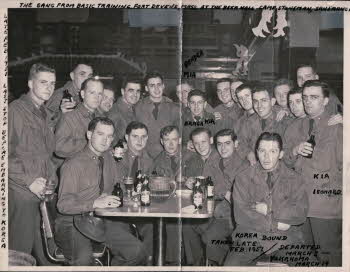Peter Joseph Doyle, Jr.
Bio
Peter Joseph Doyle Jr. was born in Syracuse, New York and graduated from high school at Onondaga Valley Academy. Upon being drafted into the Army he performed his military service from September 1950 to June 1952. During his service, he went to Busan, Korea and was stationed on the front lines from March 1951 to January 1952. He served in the Army, Company D, 17th Infantry Regiment, 7th Division, as a Private First Class before being discharged from the military. He was an Ammo-Bearer, carried one or two ammo cans for heavy machine gun squads, and participated in several campaigns. For his service he earned a Combat Infantry Badge and Korean Service Medal.
Video Clips
Reality sets in
Peter Doyle describes his departure from San Francisco aboard the USS Hase to Korea, which included a brief stop in Japan. While on the train from Busan to the distribution point for further assignment, reality set in and it finally hit home that he was in Korea. From there he headed for the front lines where he connected with the "old-timers" who had been there for a while. He says it took about a week to acclimate and get stronger in order to keep up with the more experienced soldiers.
Share YouTube:
https://www.youtube.com/watch?v=Zm03Mv2aBnU&start=339&end=615
Share from this page:
https://koreanwarlegacy.org/interviews/peter-joseph-doyle-jr#clip-1
Embed:
Supporting the Infantry
Peter Doyle describes his job in a heavy machine gun platoon and the fear of artillery fire on Old Baldy. He explains that his was a supporting role, that he supplied the machine gun with ammunition. After supplying the gun, his platoon would spread out to protect the gun which was a target for the opposition. He describes heavy artillery fire on Old Baldy that lasted for 2-3 nights; that the first night was the worst and "scared the hell" out of him.
Share YouTube:
https://www.youtube.com/watch?v=Zm03Mv2aBnU&start=652&end=809
Share from this page:
https://koreanwarlegacy.org/interviews/peter-joseph-doyle-jr#clip-2
Embed:
Living and Working with Korean Soldiers
Peter Doyle explains that his division stayed several miles behind the front lines in the reserve area, sometimes for as long as two months at a time. He goes on to explain that the 7th division had some Korean soldiers mixed in with their nine man squads and what their exchanges were like. He says that their communication was limited but they were able to exchange some English, Korean, andJapanese words. He recalls one young Korean soldier, who he nicknamed Junebug, died after Peter left Korea. He describes how one day Junebug seemed bothered that the American soldiers get to leave the war to go home and the Korean soldiers do not get to leave.
Share YouTube:
https://www.youtube.com/watch?v=Zm03Mv2aBnU&start=842&end=1125
Share from this page:
https://koreanwarlegacy.org/interviews/peter-joseph-doyle-jr#clip-3
Embed:
Mail Call
Peter Doyle explains that his parents regularly sent him packages including film for his camera and food which he shared. One time he received a chocolate cake with what he thought was green frosting but was actually mold. He recalls when they were on the frontline, the company clerk would have to move through artillery and mortar fire to get the mail to the men. Occasionally the mess Sergeant and crew would cook hot meals and send them up in thermos with the Korean laborers who would also have to brave the artillery and mortars and sometimes were killed.
Share YouTube:
https://www.youtube.com/watch?v=Zm03Mv2aBnU&start=1313&end=1459
Share from this page:
https://koreanwarlegacy.org/interviews/peter-joseph-doyle-jr#clip-4
Embed:
Video Transcript
[Beginning of recorded material]
P: My name is Peter Doyle. I’m 7, uh, 82 years old, and I was born in Syracuse, New York, and I went, I graduated from high school at Onondaga Valley Academy here in Syracuse.
I: And now that you know a little bit about the project, I’m sure you’ve talked to other veterans about their experience if they’ve already come here. How, what does it mean to you to be able to participate in this project and
0:00:30
P: Well, I find it very interesting and, and I think it’s nice that, uh, there are people interested, uh, in the Korean War. It’s been some 60 years since I was over there.
I: Correct. So hopefully you can remember
P: So this is quite interesting.
I: Yeah.
P: Yeah.
I: And what does it mean to you that we’re interested in your experiences? Why is that important?
P: Well, some people may be interested in seeing basically
0:01:00
the photographs and colored pictures that were taken over there at the time. It would give people a better idea how life was there.
I: Um hm. Do you think that not a lot of people know about what happened over there?
P: I think it is somewhat buried now, uh, the Korean War history.
I: Um hm.
P: Mostly when they, uh, go back aways into history, recent history
0:01:30
on wars they mostly focus, I believe, on the Vietnam War which is more recent.
I: Um hm. But it’s not, I mean it’s definitely more recent, but then again a lot of people focus on World War II. Why do you think they kind of skip over from World War II to Vietnam?
P: Well, it was a much smaller war.
I: Um hm.
P: Not as a large scale like World War II.
I: Um hm.
P: It was all right in one country.
I: Um hm.
0:02:00
But yet it was very important for the outcome of that particular country and the region as a whole.
P: Well, at the time, uh, the big concern was Communist aggression,
I: Um hm.
P: and we had to stop it, and that was about the first place that we were called to stop it was in Korea
I: Um hm.
P: during 1950.
I: Um hm. So let’s, uh, discuss a little bit about before the war. What were you doing, and why
0:02:30
did you decide to enlist or if you got drafted? Can you tell us a little bit about how you became a part of the military and…
P: Well, before, I was drafted, that was, uh, June in 1950, pardon me, September 1950 I was drafted. Uh, I was 22 years old at the time. Uh, I, from high school, when I graduated in 1946, I worked at Brizee Chevrolet in the Parts Department
I: Um hm.
0:03:00
P: as a counter clerk, and I delivered parts also to this, uh, other bui, uh, other auto shops in the area. And I left Brizee when I was drafted, Brizee Chevrolet Company, when I was drafted in, uh, 1952, 1950, pardon me.
I: Um hm. That’s interesting that you were 22 years old. I mean a lot of the veterans that I’ve talked to were 17 or 18 years old, so you’re a little bit older.
P: Yes.
0:03:30
That was about the normal draft age, 22, 23, 24 years old.
I: I see. I see. And this was into the Army I assume.
P: Yes. Yeah, I was drafted into the Army.
I: So what was it like during training with the younger, younger guys. Did they look up to you or
P: We were basically all about the same age, uh. Only in basic training did I run across like, uh, teenagers in the service, and they were in the
0:04:00
National Guard. I trained at Fort Devins, Massachusetts. That was September 1950 to January ’51.
I: Um hm.
P: And, uh, it was a National Guard outfit from Tennessee, the 207, 278thInfantry Regiment, and that’s where we had our basic training.
I: Um hm.
P: And they were, uh, they were young National Guard men.
I: Um hm. And so from there you, when did you
0:04:30
actually ship out to Korea?
P: I shipped out in Korea in February 1951. That was from San Francisco.
I: Okay.
P: We spent about a week at the, uh, I don’t recall, uh, the base right now. I should, but I don’t.
I: Okay. So when you got drafted, the Kor, the, the fighting had already started.
P: Yes.
I: And I assume you probably had an idea
0:05:00
of why you got drafted and what you, where you might be heading.
P: Yes. We, we had a good idea that we’d be heading, headed for Korea.
I: Um hm. And what was that like? Was it kind of a scary, oh man, I’m gonna have to go over there?
P: Some people, or, some people, some of the fellows would, uh, be worried about it. But generally we just went about our business in basic training, get accustomed to the Army.
I: Um hm. So it was kind of like
P: We did, we didn’t, uh, I, I didn’t personally
0:05:30
sweat it that much.
I: So you got drafted, and that’s what you had to do.
P: Yes. Um hm.
I: Um. hm. And when you shipped out in February to California then off to Korea, was it getting a little more real? Was reality setting in or were you just, you still had that
P: It was, uh, going a little bit more closer to reality when we were boarded on the boat.
I: Um hm.
P: Uh, that was, we were, I was on the Hase,
0:06:00
uh, the troop ship, and it took us two weeks from San Francisco. That was Camp Stoneman is where we were for a week there. It took us two weeks, when we arrived, uh, at Yokohama Harbor.
I: Um hm.
P: And we stayed out in the harbor overnight, and the next day the moved in to dock, and we embarked, disembarked and, uh, buses
0:06:30
took us to Camp Drake. It was only a few miles from, uh, Yokohama. And we had, we, we collected more, uh, of our equipment at Camp Drake. But, uh, and then we took, after two or three days there, we took a train ride south to the island of Kyushu, uh, and that was, uh, Camp Mower I believe. It was up on top of a hill
0:07:00
at, at Sasebo. It was basically a World War II anyhow, a Japanese naval base.
I: Um hm.
P: And we went through more processing, uh, at Sasebo on the island of Kyushu for about four or five days, and we, uh, received more equipment, and then, uh, we took an overnight boat ride to Pusan, Korea. And then from there, we right, we got right on the trains and went north to Jecheon, uh.
0:07:30
That was a distribution point where we, all of us were separated, uh, and went to different, other divisions. Other than that, we were together for, pretty much altogether for basic training up to that point, and that’s where they split us up into 7thInfantry Regiment or the 2ndDivision, or 2nd, yeah 2ndDivision. I went to the 7thDivision.
I: So there’s a lot of moving around and processing.
P: Yes.
I: And,
0:08:00
when did it actually hit you that you’re gonna be fighting because it seems like, you know, you’re doing so much it almost seems like
P: Well, when we docked at Pusan and boarded the train to go up north to Jecheon, uh, for further assignment, it finally hit home that this is as far as we go. We’re here. And it sort of settled in that wow. [LAUGHS]
I: You actually had to do this.
0:08:30
P: I know, and, and we headed north, uh, to our front line outfits, uh, and on the way at night, you could see all these flashes and artillery fire in the mountains. Uh,
I: They were welcoming you.
P: Yes, um hm.
I: The fireworks [INAUDIBLE].
P: Yeah, um hm.
I: What was it like splitting up from your buddies that you, that you came over with when you…?
P: We pretty much were all the same, uh, mood. We accepted it. We’re here, and you just have a job to do.
0:09:00
I: Is it hard adjusting to, I guess, the new outfit or the, the new soldiers that you’re gonna be fighting with cause my impression is that a lot of, you know, the fighting you’re kind of depending on the guy next to you.
P: Um hm.
I: And you, you might have a little more trust in someone that you trained with.
P: Okay. Well the older timers there, uh, they could climb those mountains very easily, and we’d never had real heavy physical training. And a lot of us, uh, dropped
0:09:30
by the wayside for two or three days. It takes, we, the trail behind me be a couple hours behind ever, all the old timers that were, could, were used to climbing those hills. But after about a week, uh, your legs got stronger, and, and your wind got better and you, uh, you could keep up with the regular guys.
I: Um hm.
P: And they, we, we melded in, uh, quite well with the, with the old timer veterans who had already been there.
I: Um hm. Did they offer any advice?
0:10:00
P: Not too much, just follow along and stick together. I don’t recall a lot of mentoring to speak of.
I: So it’s just more on the job training
P: Yes.
I: if you will.
P: Um hm.
I: And could you tell me about, you know, your first experience on the line, what it was like, how you were feeling when you first set up camp and got stationed?
P: No, we just more or less
0:10:30
went along with the situation and didn’t, you know, get too concerned about it. I mean, you, you didn’t have any choice. Just accept the way things are. Uh, trying, trying to recall other things. But, my, as for myself, I was not actually with a rifle company. They were usually about, uh,
0:11:00
two or three hundred yards ahead of us, and I was in the machine gun, Heavy Machine Gun platoon, and we’d give supporting fire, and I carried ammunition up to the machine gun, uh, and then we’d spread out and, to, uh, in a perimeter to protect our particular machine gun.
I: Um hm.
P: But, uh, we were in a basically my outfit, I was in a supporting role. At night, we would tie in with the rifleman.
0:11:30
But, uh, generally, uh, things went along pretty well as far as I was concerned for myself.
I: Um hm.
P: We would get incoming artillery fire at times. That was pretty serious there.
I: Was there ever a moment where you were scared for your life and thinking what am I doing here or were you always just trying to think to yourself this is what I’m doing and I just gotta let
P: Well, one, one time we got plastered
0:12:00
pretty heavy, uh, by the enemy artillery fire on, that was on Old Baldy, that, uh, lasted for about two or three nights, uh. But the first night was the worst, uh. And it, it sort of scared the hell out of you. But, uh,
I: It was the worst
P: that passed.
I: It was the worst because there was just so much fighting going back and forth?
0:12:30
P: Um, uh, in our particular spot it wasn’t too bad in, in the supporting role of the Machine Gun, uh, platoon. And we were right alongside the recoilless 75 mm rifles were also in a supporting role. We’d ba, we were supporting the ridges where the infantrymen were out in front of us. That would be about two or three hundred yards on ahead. At night we’d tie in like I said before.
I: So the machine guns, from what I’ve heard, are for, a lot of times
0:13:00
a target of the opposition because they’re such a powerful weapon.
P: Yes. Uh, well, the infantry, uh, out ahead of us, the infantry, infantry platoons had uh, uh, light machine guns in the same caliber. That was 30 caliber, uh, and they would be right with the rifleman, and, uh, they would, uh, the enemy would go for their, their, those positions,
I: I see.
P: try to knock out that machine gun.
0:13:30
I: So how long were you actually there for, over in
P: I was there for nine months.
I: Nine months? And did you have any impressions of Korea while you were there, you know, the, the landscape or the civilians or the other Koreans that you might have met?
P: Uh, until I went home, I saw, uh, quite a ways in back of the line at Chuncheon, uh, I saw a lot of the, uh, civilian
0:14:00
population, uh. But where we were, uh, on the front lines, we didn’t see any villages at all for nine months basically.
I: Yeah.
P: We lived in the hills
I: Right.
P: And we would live behind, several miles behind the front line positions in the hills in a reserved area. There was a couple of periods where for two or three months, two months at least, uh, we were in a reserved area. We were around the WatchungReservoir area for quite a while.
0:14:30
I: Um hm.
P: In the summer of 1951.
I: Did you ever interact with Korean soldiers or foreign allies, foreign troops?
P: Well, the, uh, not the Korean ROC Army, uh. But we had Koreans, young Korean soldiers in, mixed in with us.
I: Um hm.
P: I don’t know if all the divisions, uh, had Koreans mixed in with them, but the 7thDivision did.
I: How was that?
P: And I was with the 17thRegiment, and there’s, of
0:15:00
a nine-man squad, there was about two or three Koreans in each nine-man squad.
I: And did you have communication problems, or was it okay?
P: They, we would sort of speak a bit like pitch in English,
I: Uh huh.
P: mix a little bit of Korean words, a little bit of Japanese words, uh, in with the English words. Like, uh, if somebody got killed, they would, uh, Korean boy might say he all-time sleepin.
0:15:30
I: Some
P: Instead of he got killed or he died. He, he all-time sleepin.
I: Sleeping, yeah. I understand. And did you ever get a chance to interact with them when you were not fighting or down time or
P: Yes, I, there was one, uh, Korean soldier, uh. He was killed after I left, but he was a very nice boy. That was, uh, Jin Jong Man, and his nickname was Junebug. We had nicknames
0:16:00
for the different Korean soldiers, uh, that were with us, and he wanted to learn English very, very badly.
I: Um hm.
P: And, uh, so I tried to explain to him the different English words like, uh, uh, if that’s a very big mountain, in Japanese it would be oh, that’s a toxson mountain. That means big. But it, you, I would say well, that, in English that would mean big or very large.
0:16:30
I: Um hm.
P: And I would try to explain the difference between the to’s, T O, T W O, and T double U, T double o.
I: T double o, yeah.
P: And, uh, and I would try to throw so, throw those two, three words into sentences,
I: Um hm.
P: uh, to make it clear the difference between the two or three, and I’d do that with a, with other English words. And he seemed to appreciate that.
I: So it’s good that you had a opportunity to interact
0:17:00
and learn from each other.
P: Yes, um hm.
I: Was that, did that kind of help you go on in the war to think about other things and develop relationships with
P: Um hm.
I: other people?
P: I didn’t continue correspondence after I went back home
I: Um hm.
P: with, with any of the Koreans,
I: Um hm. But at least while you were there it gave you an opportunity to think about something else.
P: Oh, we mixed, yes, um hm. But they, as a rule which is understandable, they would gather among themselves. That was common language there,
0:17:30
and,
I: Of course.
P: they, so they tended to, like anyone, uh, anyone, uh, in a, in a group, uh. You stick to your own group as a rule. But they, they, they met you, they mixed in with us very well.
I: Um hm. And so you said you interacted with some civilians afterwards.
P: No, yeah. I did, I had their addresses, uh, one or two. But I didn’t continue correspondence.
I: Okay.
P: Well, I did continue, he was still in the Army. What bothered
0:18:00
Jin Jong Mann is that you go home after nine or 10 months, but we have to stay here, uh, all the time. And it sort of hit him a little hard, that we would leave, you know, in nine months or so. But as I would say, is, this is your country.
I: Um hm.
P: But we got along very well.
I: Did he feel like you guys were giving up on him or the country or did he understand that that’s just how the military works, that new people will
P: I think they realized that, uh, we were there only for a short period,
0:18:30
and we would have other, uh, soldiers replacing us as we left. So we were there always in their support.
I: Um hm. So you must have still been grateful for, you know
P: Yes. Um hm. I believe so.
I: Okay. And after nine months, you, you were shipped home?
P: Yes, um hm. And t hen I spent three more months in the Army, and then I was separated.
I: Um hm. Were there any, looking back
0:19:00
on your experience there, were there any situations that you can remember or you feel comfortable talking about that were, you know, maybe the toughest to, to cope with and, and go through?
P: Generally, uh, not too bad. There was a few situations that you just don’t, rather not talk about,
I: Um hm.
P: things that happened.
I: How ‘bout the happiest time when you were there, maybe as a lot of veterans say is when they were shipping home or they found out they were shipping home or maybe your
0:19:30
relationship, uh, with the Korean soldier, teaching him English. Were there any memories when you look back that kind of make you smile?
P: Oh yeah. There’s, there’s certain good memories. We got along well. We clowned around together, uh. It wasn’t dead serious all the time, uh. Generally, you, uh, most of the guys kept pretty light attitude, you know, a good attitude.
I: Well, I guess you
P: And we visited, uh, with the Koreans that were mixed in with us
0:20:00
while right up on the front lines.
I: Um hm. So I guess you need something to take your mind off of the seriousness of, of battle a little bit, do you know what
P: Well we, we tended to joke quite a bit about it, so.
I: Do you remember any specific, specific stories of when you guys were joking around or having a good time, maybe during R and R?
P: Oh, mostly over there, I can remember one funny incident, uh.
0:20:30
We pitched our, our large squad tents. Squad tents carried, uh, 20 people or, say, slept 20 men. And we had several in our [INAUDIBLE] area these squad tents, and we had pitched them in rice paddies. It, it was in the wintertime. The, and the ground was frozen.
I: Um hm.
P: Well, we had a thaw during the night,
I: Great.
P: and the tent stakes pulled up, and the tent fell off to one side,
0:21:00
and we were staring up at the stars. And it happened to another tent next to us, and they thought we had pulled their stunt, their tent stakes up,
I: Um hm.
P: and they went and pulled another tent down because we thought we did pull their tent down on purpose, and it was just the rice paddies, uh, ground softening up.
I: Uh huh. That’s pretty funny. So everyone thinks that they’re getting a prank pulled on them so
P: Yeah, they thought we were, we, you know, we pulled a bad one
on them. [LAUGHS]
0:21:30
I: So how did it feel to actually ship home, to leave Korea?
P: It was a good feeling. Glad to leave.
I: Yeah.
P: You know.
I: Go home.
P: Um hm. Well, mostly your mind was, in your mind was everybody had the same thought when they were rotating home. You made it back.
I: Um hm. Um hm. Did you have any correspondence with your family while you were there?
P: Yes. My folks, uh, corresponded, uh, regularly.
0:22:00
I always had mail came, come mail call.
I: Um hm.
P: And they’d send, uh, film me for my, my camera
I: Um hm.
P: and, uh, and, uh, also there were food packages.
I: Oh, great. So you
P: And I’d split some of the, of it up with some of the other guys. One time I got a nice cake, and I opened it up, and I thought that green line going through the chocolate cake was, uh, another, uh, frosting of some sort it might have looked. Fortunately, a friend of mine says don’t eat
0:22:30
that. It’s went bad.
I: It was probably mold, right?
P: Yeah, it was mold.
I: Yeah.
P: But I thought it was a, a coloring. [LAUGHS]
I: That might have put you out for a couple days.
P: Yeah, it would have did a number on me, too.
I: So how were, how did it feel to get those letters, you know, those little connections back home?
P: Oh yeah. There was always a couple of guys I think that it bothered them that, that they didn’t get letters.
I: Um hm.
P: But the way it goes, if you don’t write yourself,
0:23:00
you won’t get letters as a rule.
I: Um hm.
P: But most of the guys, uh, wrote back and they were right there for mail call to get mail from back home.
I: Um hm. That’s great. So
P: That was a big deal. Mail call was a great thing.
I: Yeah. Yeah. Takes your mind off of
P: Um hm. Yeah. When we were right up on the front line positions, a company clerk would bring our mail up, and he’d have to come through artillery fire or mortar fire sometimes, uh, to bring the letters up to us.
0:23:30
We would be up on top of the hill, and he’d be down there nice and safe in his tent, generally as a company clerk. But that’s okay.
I: You can’t tell the other side stop firing. We have mail.
P: Um hm.
I: Let us get our mail.
P: Yeah. Then they had the Korean laborers with, they, uh, they would, uh, our mess, uh, Sergeant, uh, and crew would cook up hot meals for us, and they’d put them in these thermos containers, and this would be in back, a couple miles of back of the lines,
0:24:00
and the Korean, uh, laborers would carry these on their backpacks, uh, these thermos packs filled with food and, and coffee up the hill to us.
P: Um hm. That’s great.
I: And they had to brave, uh, brave this mortar and artillery fire.
I: Yeah.
P: And they had casualties.
I: Sure. What was that like, witnessing those casualties? Was it hard?
P: Not too bad.
I: Yeah. So you’re home, you get,
0:24:30
you arrive in the United States, and you said you have three more months of service before you’re discharged?
P: Yes, um hm.
I: How’s it, so when you finally got to see your family, how was that? A long time coming?
P: Oh yeah. It was very good feeling, uh. Most of us, I think, adjusted quite well back home. It worked out all right.
I: And you came back to the Syracuse area?
P: Yes, um hm. Went back to my same old job at
0:25:00
Brizee Chevrolet Parts Department.
I: Yeah. It was there waiting for you?
P: Yes, um hm.
I: And I’m wondering how your experience in Korea impacted your life in the short term and, you know, throughout your life afterwards? How did it change?
P: Uh, mostly I can say that I kept, uh, in contact with some of the, the guys.
I: Um hm.
P: Uh, mostly Christmas cards.
0:25:30
There’d probably be about four or five or six of the fellows that always sent Christmas cards back and forth, and it wasn’t for, till about 20 years later we, we started getting together, uh, into the New York group, uh. There’s a friend of mine over, from basic training, and he ended up over there in Korea, too, uh. We would have, uh, summer parties, a weekend party, beer and, uh,
0:26:00
hot dogs, lot of clams.
I: That’s great.
P: Cook, cook out if,
I: Yeah.
P: Yeah. And we did that for about, about six, seven years. We jumped from, uh, we’d take turns putting a yard party on for, for a weekend.
I: Um hm,
P: Weekend cookout.
I: So it was a good opportunity to, do you guys reminisce on your experiences, or was it just kind of good to be with some familiar faces?
P: We didn’t, uh, talk too much a lot on the experiences. We’d bring, uh, maybe set up some pictures that we had taken and put the on a board
0:26:30
I: Um hm.
P: Uh, we’d play music, some of the old time records back of that day
I: Um hm.
P: and that while we’re drinking our beer and sh,
I: That’s great.
P: and play, and we’d play horseshoes. We loved to do that.
I: Oh yeah.
P: Yeah, um hm.
I: Sounds like a good experience.
P: Yeah, pitching horseshoes and beer. [LAUGHS]
I: Do you still keep in touch with some of your buddies from back then?
P: Uh, there’s a couple that I still keep in touch with, um hm.
I: Um hm. Um hm.
P: A lot of them passed on now.
I: Yeah. So
0:27:00
I guess that’s, you know, one of the reasons why we like to do this project, so we can hold onto that memory while we can and have it for our future generations and grandchildren and great grandchildren.
P: Um hm.
I: How has your perspective on life changed since you’re been back? I mean, thinking back on how the war has kind of changed your, your view of the world?
P: Well, I think mostly it looks like wars are forever.
I: Um hm.
P: There’s been a lot since I, since the Korean War. It’s
I: [INAUDIBLE]
0:27:30
P: And they keep on going.
I: And they keep, yeah.
P: I guess they keep on, and will keep on going.
I: Have you, have you been back to Korea?
P: No, I have not.
I: Um hm. Have you thought about it?
P: Not too much.
I: It’s something
P: Uh, they do have the Korean, uh, Revisit tours.
I: Right.
P: Uh, but I haven’t had all that much interest in going back.
0:28:00
I: What, what do you think about how Korea’s role in the world today after, you know, the Korean War and how much it’s, how far it’s come in the past 60 years?
P: I think the best, to use a phrase, you came a long way, baby. [LAUGHS]
I: [LAUGHS]
P: They really have made a quite a comeback
I: Yeah. How do you
P: Well, they’re better than they ever were before.
I: Right.
P: They’re very, I think it’s wonderful the way the country, South Korea, has recovered.
0:28:30
I: In what way wonderful,l just the fact that they’ve developed economically and…
P: Yes, and they’re, they’re, one of the world’s best economies.
I: Um hm. And do you feel that your presence over there played a role in that, or the American presence at least?
P: I feel that, uh, I was glad to do my bit over there and, and it’s nice to see the country has recovered the way it has.
I: Um hm. Um hm. Do you think that the two countries will, North and South Korea will ever reunify?
0:29:00
P: No, that’s, that’s a hard one to, to figure out, uh. They’re pretty much stubborn group up north [LAUGHS]
I: Um hm. Yeah. That’s a sentiment that I’ve found from talking to a lot of veterans. How about, do you feel, when you think about the North Koreans and perhaps the Chinese were over there also in opposition of, of your forces, do you have any animosity towards them? Do you think some of these feelings that North Koreans
0:29:30
are stubborn is because you were fighting them or do you think that’s …
P: Oh, I, I, I don’t have that much animosity against the Chinese. They’re still a Communist country, uh. I think it’s run, uh, pretty loosely on Communism. Their, their economy’s spread out throughout the world.
I: Um hm.
P: Uh, but they stole our eco, they stole, in many ways, our, our diehards and our beliefs.
0:30:00
But I think it, uh, things may get better as relationship wise over there.
I: Um hm. If there’s some escalation over there again and say you were 22 years old, would you enlist or no?
P: I don’t know how, how my feelings would be, uh.
I: Um hm.
P: I was never much on enlisting. I didn’t mind being drafted, but I didn’t
I: Necessarily.
0:30:30
P: Not that much of a volunteer I guess.
I: Yeah. I feel the same way. So
P: I was glad, all I can say is I’m glad that I didn’t flunk the physical exam
I: Uh huh.
P: to go in the Army. I did wanna pass that.
I: Uh huh.
P: So it wasn’t too hard to accept.
I: Well you did, and I think you proved that you were physically fit to last over there.
P: Yeah.
I: So over the past 60 years, have you, do you think about your experience over there a lot?
P: Not, not too much.
0:31:00
I: Um hm.
P: I have a lot of other things that I’m invo, I’m involved in. So I, I don’t think too much about over there.
I: Did a, did your family ask about it at all, or have you had the opportunity to share your thoughts?
P: Well, some experiences, but I didn’t talk too much about my experiences with my family over there.
I: That’s what those weekends were for with your old buddies?
P: Yeah. With your old buddies, uh, somebody that was, uh, in the Ar, in the service you would visit and talk about things.
0:31:30
but
I: Um hm.
P: Not so much with family.
I: Um hm.
P: Um hm. Well, they have that term, it’s the Forgotten War.
I: Um hm.
P: It sort of gets bypassed. But it still gets resurrected in the news every now and then.
I: Um hm. How do you feel about that, that it’s called the Forgotten War?
P: Well, it’s not a nice term. I hate to see it become forgotten, uh. A lot of, a lot of us, uh, made our
0:32:00
contribution for democracy over there.
I: Yeah, well I mean I think we’ve established that it was an extremely unfortunate war, not just for America but for the war in, for the world in general, and, you know, one of our missions is to, I guess, erase that term, Forgotten War, so people will understand it.
P: Well, for one thing it was a United Nations war. So there’s a lot of other nations that were involved,
0:32:30
and they haven’t forgotten being over there. At least the men from these different countries haven’t forgotten.
I: Um hm. Um hm. A couple veterans have mentioned when Bill Clinton called attention to the fact that it was this military police action and, and, you know, mentioned yes indeed it was a war, and a lot of veterans were, were proud of that because there was finally some recognition that they were receiving.
P: Well, I don’t think it was just President Nixon wanted to
0:33:00
push the term police action.
I: Um hm.
P: Uh, most of the war veterans from Korea, uh, don’t care much for that term. A war is a war, and that’s what it was. Korean War.
I: Um hm. Okay. So I’d like to end just by asking you if you could maybe provide a message or two or some words for future generations of grandchildren and students and, and people who are interested in the Korean War who will be looking at our project and the data base and your interviews to
0:33:30
get some insight on their experiences of the Korean War veterans. If you could maybe provide a message or two to them.
P: Well, I hope, uh, my photo collection that I have might, uh, throw some enlightenment on, on the, uh, how life was over there during 1951
I: Um hm.
P: Uh, and it, that’s about the best I could say. Uh, they just don’t hit, uh, I think it’s nice that it is, it doesn’t become a, a forgotten war.
0:34:00
I: Um hm. Well hopefully we’ll, we’ll do our role well, and it’ll lose that term. Mr. Doyle, I appreciate you coming and talking to us.
P: Yes, sir.
I: It’s been a real pleasure talking to you.
P: Same here.
I: Uh, before we end this interview, we have something that we’d like to present to you. This is the Ambassador for Peace Medal given by the government of South Korea, and it’s provided through the ministry of Patriots and Veterans Affairs and the Korean Veterans Association.
0:34:30
P: Alright.
I: And, as a token of their appreciation, they would like to present to you with this medal
P: Oh.
I: And it says Korean War Veteran Honor. If you wouldn’t mind, I can place this around your neck.
P: Okay. Sure. Want me to, I can hold that.
I: Sure. It’s yours so… [LAUGHS]
P: All mine.
I: [LAUGHS] So you are not forgotten. You are being recognized and hopefully, hopefully you know that.
0:35:00
And thank you very much for coming and talking to us. We appreciate it.
P: Oh, it was my pleasure. I appreciate, uh, being interviewed.
I: Great.
P: Okay.
[End of Recorded Material]
Photos
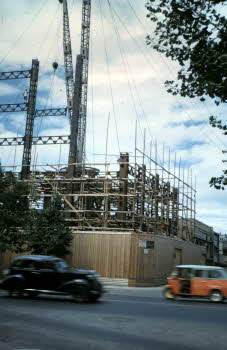
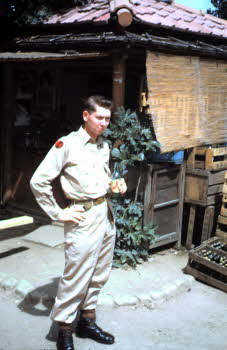
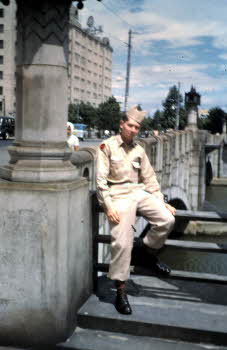
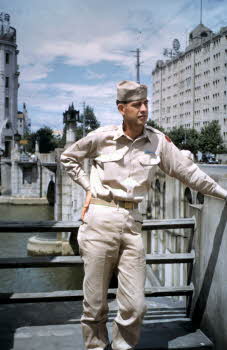
MG group at MLR Kumhwa, North Korea
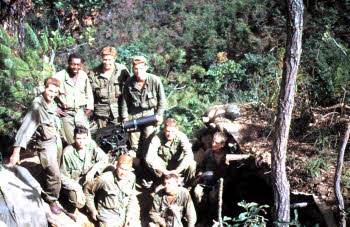
Recon Patrol MLR
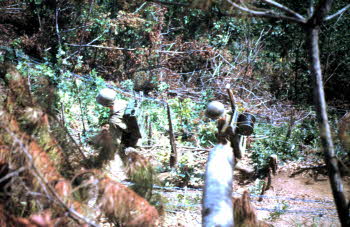
Hill 841/ Old Baldy at Chupari
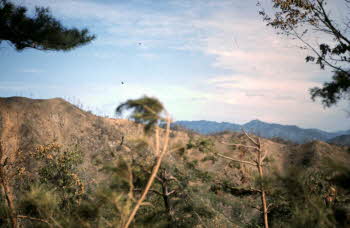
M. Stew and Machine gun, (Hill 841 / Old Baldy at Chupari)
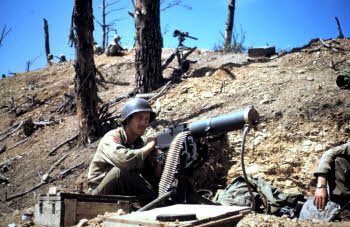
Guard view on Old Baldy (Hill 841 / Old Baldy at Chupari)
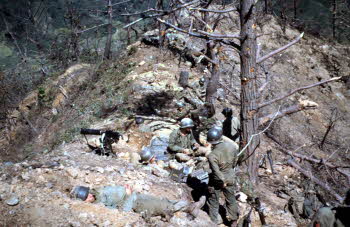
Hole Sleeping
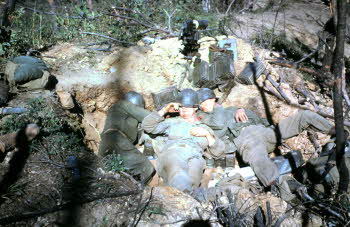
M. Stew and Medic Smith on hill 841- Old Baldy in Fox Hole
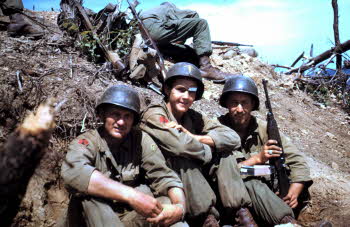
Jo Joong Koo and Bacon on Old Baldy
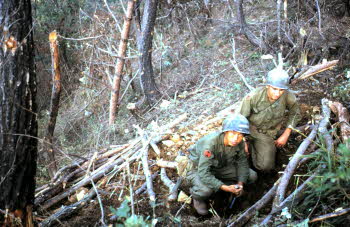
S. Seryo 55 close on Old Baldy
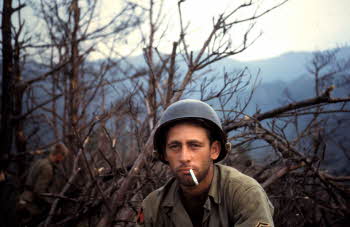
(Hill 841 / Old Baldy at Chupari)
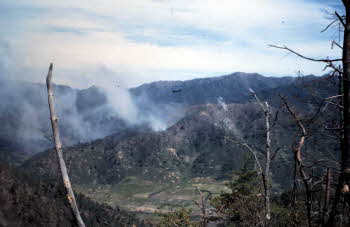
High explosive (H.E.) Hit seen between Trees - 31st REGT
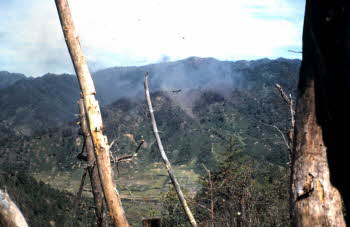
Salvage overturned tank hit by land mine
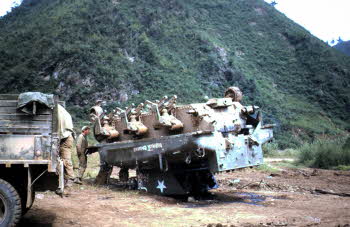
Good View convoy, freight moved to Munsan-ni (Western trip)
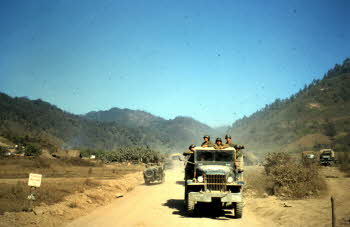
Sign in front of a base - out of focus
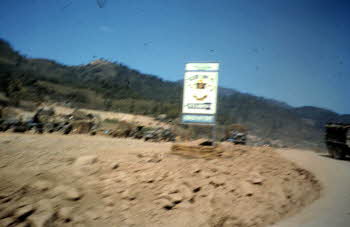
View of countryside - to Munsan
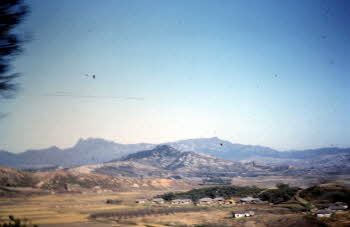
Convoy stopped to Munsan, Berns & Anderson
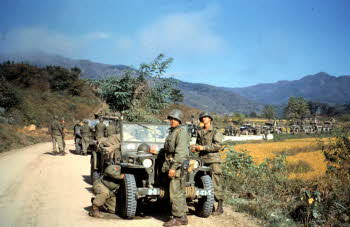
Digging fox holes
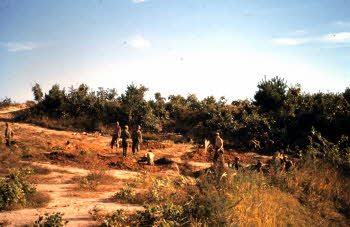
SQD (squardron), TENT of M.G.S.
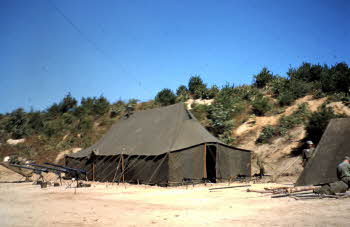
Nice view, M.G.S. close up of tent
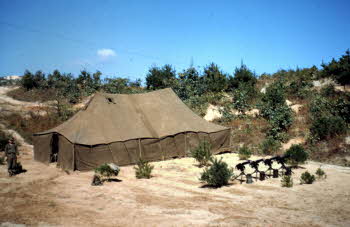
Good view of M.G.S.
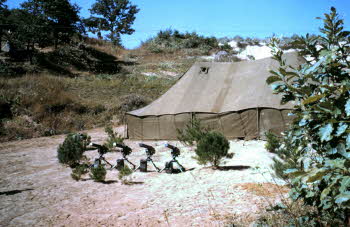
Jeep convoy to Tokkol-li reserve
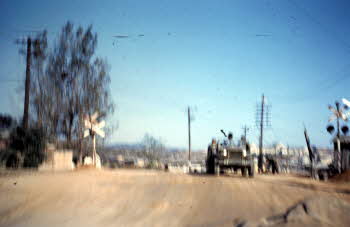
Back to east-central front
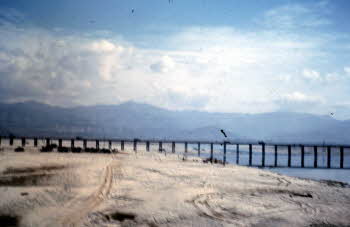
Putting up flag pole
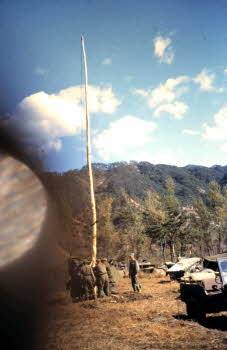
R.R. rifles, PLTN + SQD. Tent
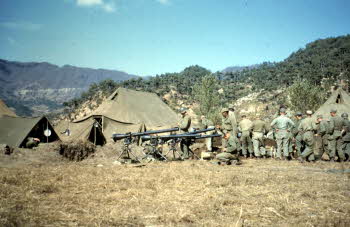
R.R. side view /75s pup tents
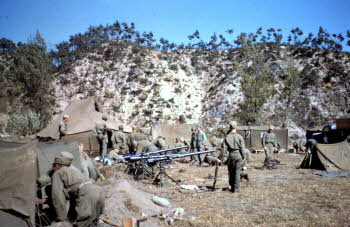
Tokkol-li, North Korea
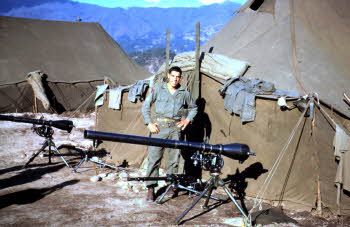
(from left to right) Anderson, Clodfelder, Tofsly cleaning Machine gun (M.G.). Nice at M.G. Range water cooled
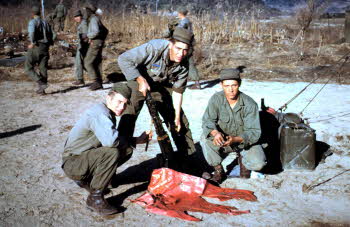
Peter Doyle standing in front of water cooled Machine Gun
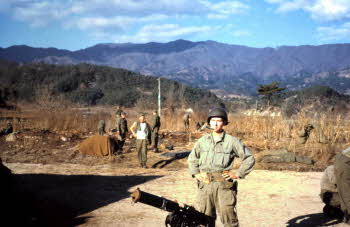
(Left side) Peter Doyle, Anderson, Chak, Bride
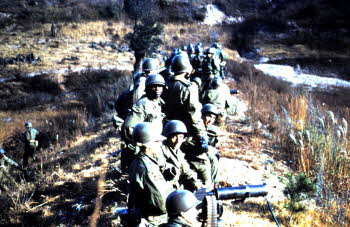
Jeep of Chaplain, Peter Doyle, Vandyke being set up a shelter for mass, flag pole, hills
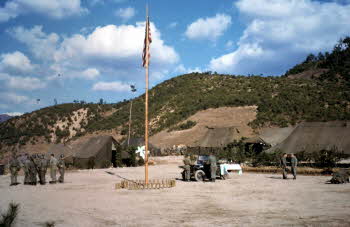
Mass is over. Chaplain Vandyke removing vestment, back to camera
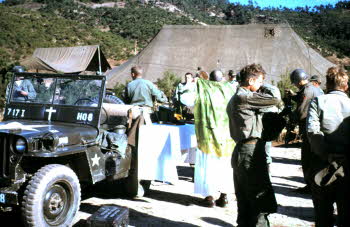
Front lines MLR, Hill 1243 + Punchbowl, Nov. + Dec.
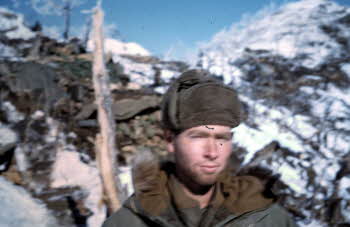
(From left to Right) SGT.Staton, Clodfelder, Chakman Joan, on the way Peak of Hill 1243
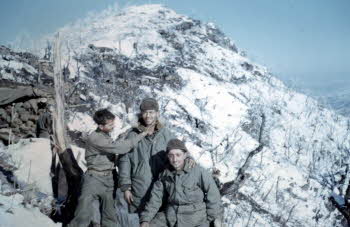
PFC (Private First Class) Peter Doyle eating canned food, beans
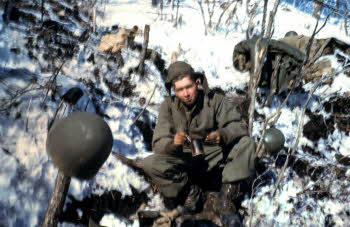
Closer view, Peter Doyle finished eating
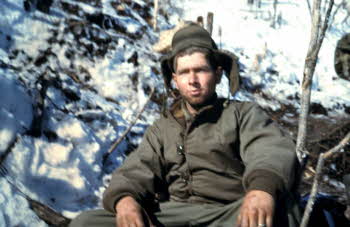
Jo Joong Koo melting snow in helmet for water, for coffee, chocolate, or washing
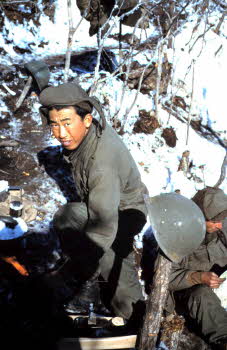
PFC (Private First Class) Peter Doyle in parka, -full winter gear
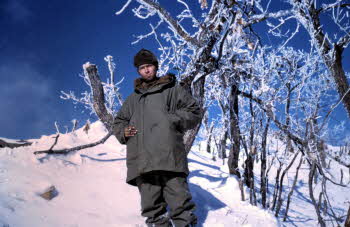
View to rear and down into "punch bowl", Peter Doyle inside "punch bowl" reserve area
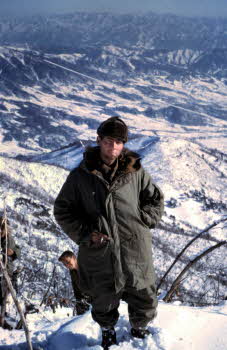
Close up, before shaving, Co. Dog, 17th REGT, squad tent pitched on frozen rice paddy
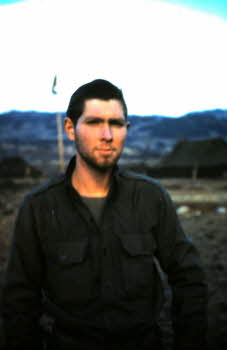
View of Hills of Peak 1243
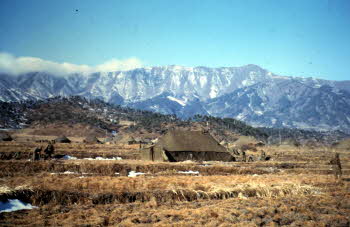
Pete Doyle looking at his 45 auto pistol after cleaning. Men in back cleaning weapons. Peak of hill 1243 to right
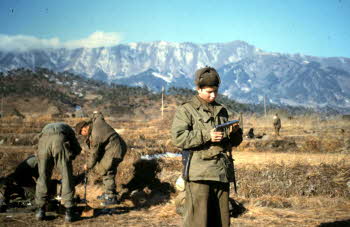
View of our Co. Dog reserve area and tents of U.S. Flag and Christmas tree, view to N.NE.
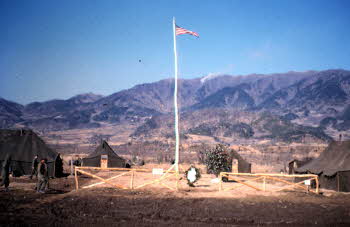
View of Co. D, 17th REGT, Reserve area to NE. 2 1/2 ton truck, tents, U.S. Flag, Thawing + mud
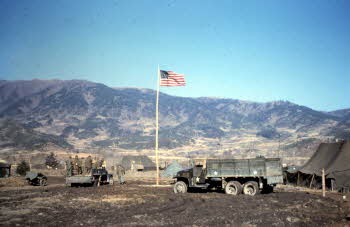
Co. D 17th infantry REGT. Command Post area while in reserve, in front of Chrisimas tree (L~R) Pete Doyle, Ha Yongsub, Leo Chakmakjian with Dog and Clodfelder.
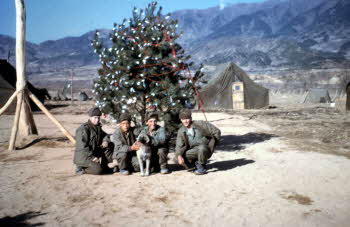
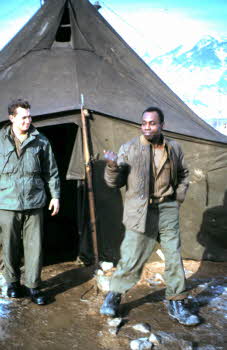
SGT Fred Staton Atleft and PFC Bride in front of squad tent. Bride drunk only couple drinks
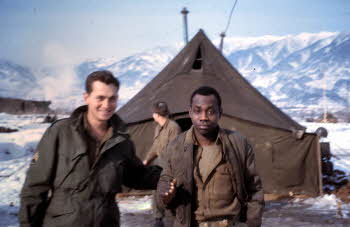
Closer view of PFC Peter Doyle after shaving
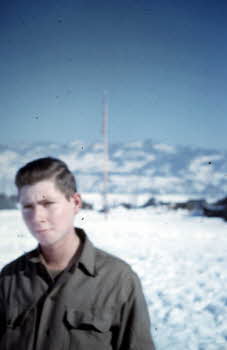
PFC Peter Doyle with sunglasses and smoking
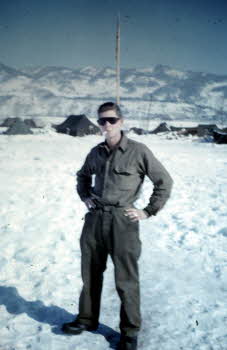
Co. D 17th Infantry REGT. M.G. platoon men with sunglasses (L~R) PLTN. SGT. Carl cook, P. Doyle, SGT. F. Staton, SGT. John Berns
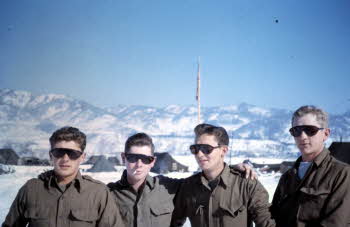
ROK Army soldiers in Co. D. 17th infantry. REGT. (L~R) "KIM" Che Chang Ku, unknown, Ha Young sub, unknown for kneeling, and Jo Joong Koo
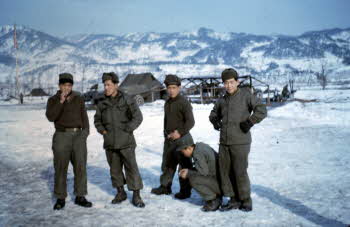
PFC Pete Doyle with SCR 300 Two-way radio, about to go on a field march with group (training + exercise)
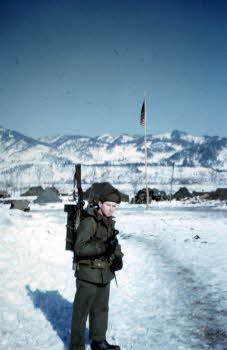
Group marching out.
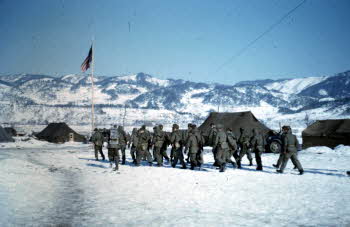
Setting up squad tent. Moved to Yanggu
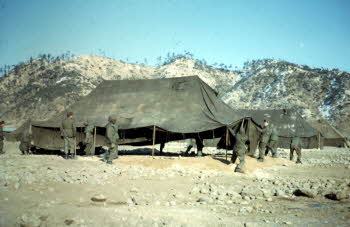
Setting up squad tent. Moved to Yang gu
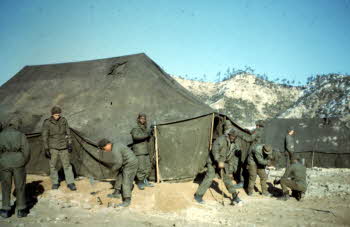
Squad tent up. (sleeps 20 men, two kerosene stoves)
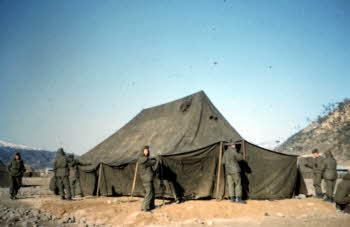
View of Co. D, 17th Infantry. REGT. squad tents. Very cold.
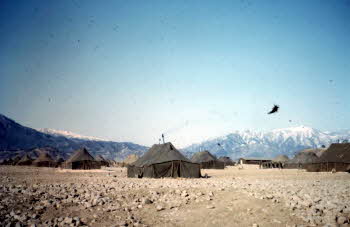
View of Co. D, 17th Infantry. REGT. squad tents. Very cold.
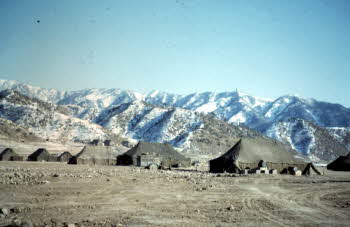
View of Co. D, 17th Infantry. REGT. squad tents. Very cold.
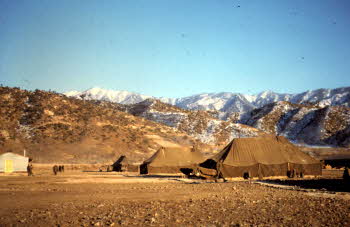
View Near 17th REGT. Command Post tent and new metal buildings
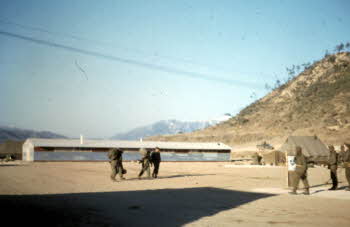
Co. D. 17th Infantry Command Post tent in center REGT.
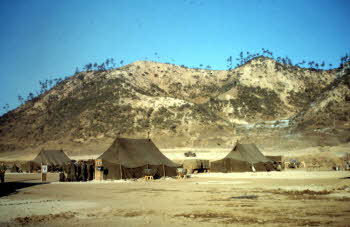
Closer view Co. D, 17th Infantry, REGT. Command Post Tent
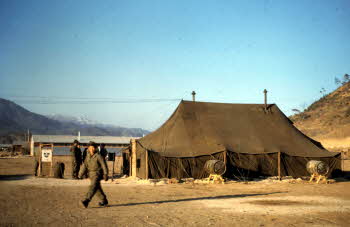
Order to inducted men in Syracuse from U.S. Army & U.S. Air Force Northern New York Recruiting District First Army
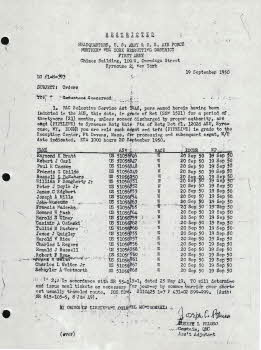
Article of two Ocounty men(Pfc. Frank J. Cannato, Corp. Frank H. Smith, son of Mr. and Mrs. Dwight Smith) wounded and a Syracuse man (William J. Smith) injured in Korea,
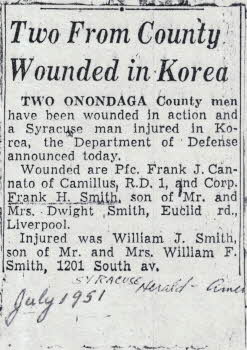
He was drafted same time as Peter Doyle on 19 Sept. 1950

Manual of the processing to start basic training for all new entering service
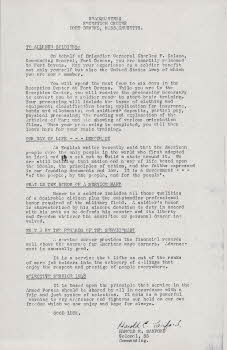
To all new entering the service, greeting paper from Army Chaplain
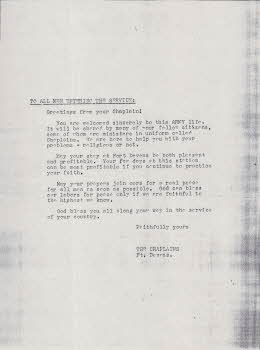
Memorandum to all enlisted men processing Through IRP, Fort Devens, Mass.
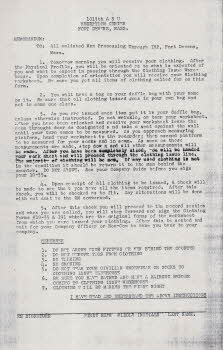
Extract Order that has Peter Doyle's name on it
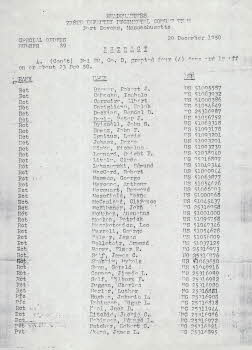
CAMP STONEMAN NEAR SAN FRANCISCO, SOME OF THE 278 R.C.T FROM FT. DEVENS, MARSS. BASIC TRAINING. THE BEER HALL (L~R: 1st line - Joe Leo, Luck, Bert Bozzuto, Bender, Tomy Draga, Sehuctz Scvchtz, Bob Brewster, Thad?, Mabin, Dwicett / 2nd line - Mains, Bob Zehander, Mcarty, George Russell, Al Carrario, Wayne Mansfield ), When boarding ship the band played "So long it's been good to know yah!" Popular song, singer was Guy Mitchell. Doyle and some of the gang on the base ship, the rest went on the Brewster ship Schuylerville/Thomson, NY.
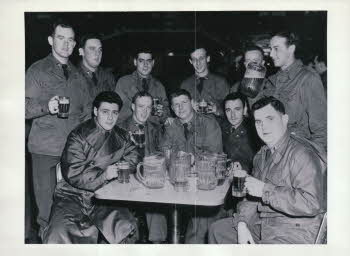
CAMP STONEMAN NEAR SAN FRANCISCO, SOME OF THE 278 R.C.T FROM FT. DEVENS, MARSS. BASIC TRAINING. THE BEER HALL
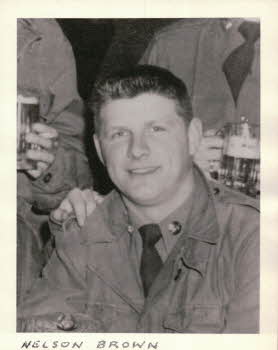
Peter Doyle in front of a military truck
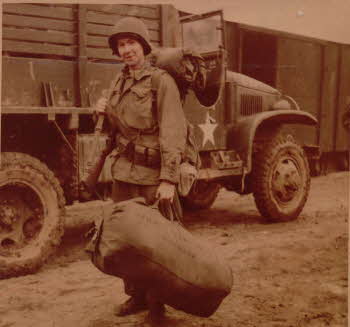
Soldiers lying down and taking rest during the long trip
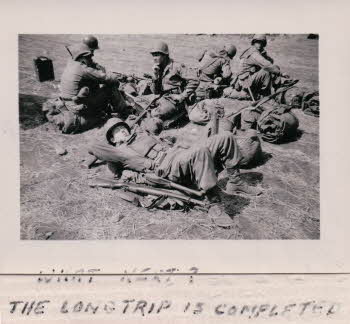
Doing maintenance at the military base
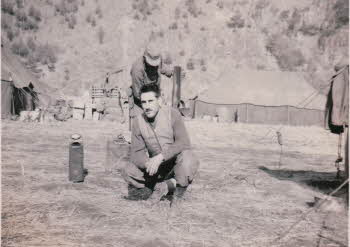
Battle map from 20 May to 1 July 1951 (Eighth Army Advance 20 May - 1 July 1951: Frontline on 20 May, Corps Road Center Objectives, Frontline on 15 Jun - 1 Jul, Order of Battles as of 1 Jul, Enemy Order of Battle 1 Jul, High Ground above 1,000 Feet )

A soldier reading newspapers at dented ground***
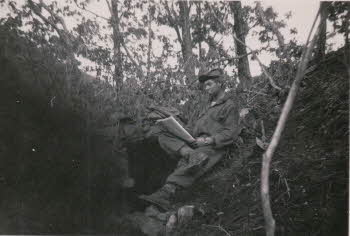
Soldiers pointing with machine gun at mountain military base
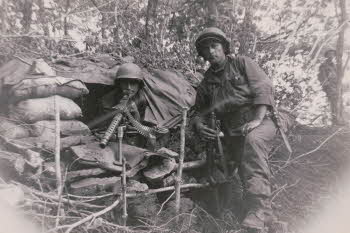
Article on great victory in first round of red offensive
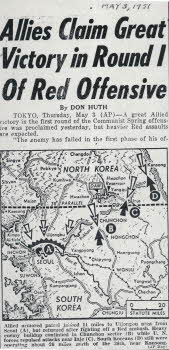
Article on great victory in first round of red offensive
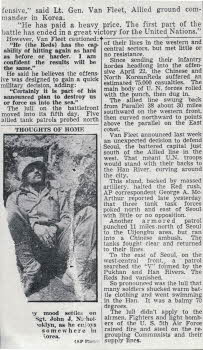
Article of SFC Joseph C. Rodriguez, C.O.F, 17th Infantry. REGT, 7th DIV awarded Congressional Medal of Honor - action of May 21, 1951
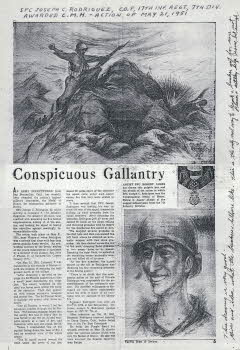
Lyrics of "Banp Gune, Montars and High, High, Mountain"
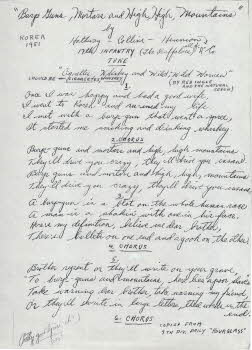
Peter Dolye said "Front line, 22 April seems incorrect 17REGT. Advanced this Chun chon in June. We stopped near Kumhwa in June. "
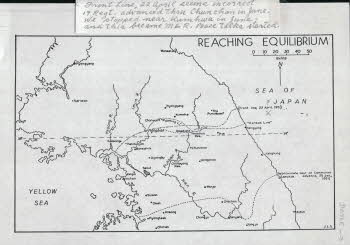
Peter Doyle said "Late June to early August, our Co.D + others of 17th Regt. Were in reserve area at Hwachon. June 1951, U.N. stopped advancing and the MLR was established at the front line. Peace talks started. 17th Regt. On the front at Kumhwa, MLR."
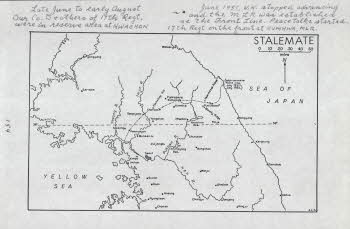
A map that show three years of war
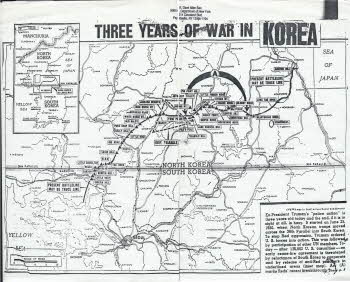
Peter Doyle, Leo (called "Chipmunk" Chakmakjian of N.Y.C.), and Ha yong sub (called "Papasan" in middle of three).
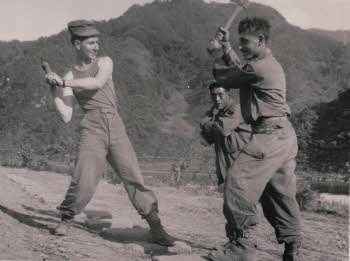
Leo and Doyle in reserve area Hwachon, North Korea
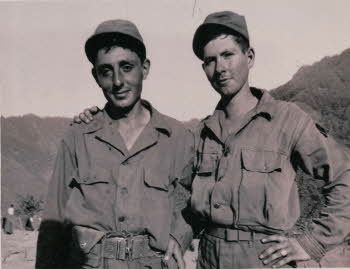
Peter Doyle, Espernet, and Leo Chakmakjian
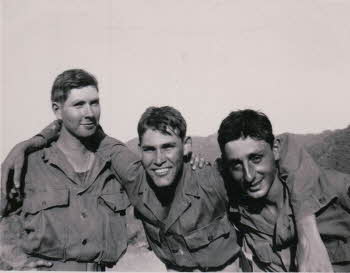
A picture of 30 caliber machine gun platoon Co.D, 17th Regt., 7th Div. July 1951 in reserve area Hwachon North Korea
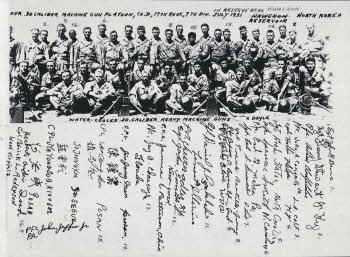
In reserve area at west end of Hwachon reservoir, ROK army soldiers attached to Co.D. 17th Infantry Regt. 7th division. Ha young sub (standing), Jin Jong man (second from right), Pete Doyle (at extreme right)
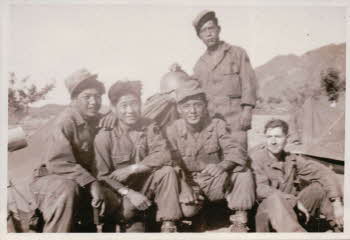
Back to the MLR near Kumhwa, North Korea after being in reserve at Hwachon reservoir. (from left to right) SGT. Carl, cook of sault Ste. Marie, Michigan / SGT. Harry Stewart of Harlan county, Kentucky / Crider (killed in motor accident November or December). Sitting on top of dead bodies buried in June.
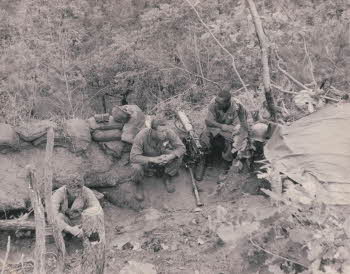
Safe conduct certificate, good treatment to enemy soldiers
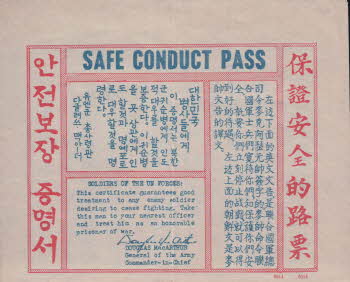
Safe conduct certificate, good treatment to enemy soldiers
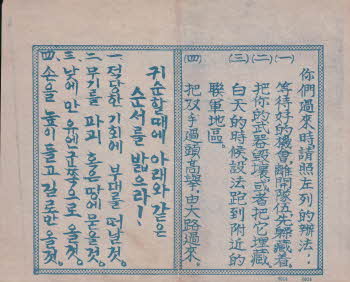
Peter Doyle smoking and tying shoestring in underground tunnel, shovel and grenades are around him
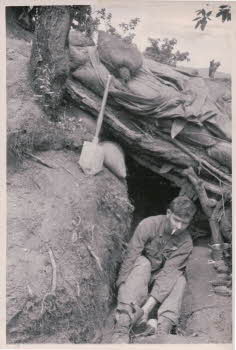
Command posts of first battalion, 17th infantry Regt. At the MLR. Kumhwa
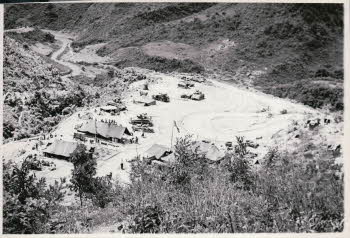
Path from command posts to MLR positions
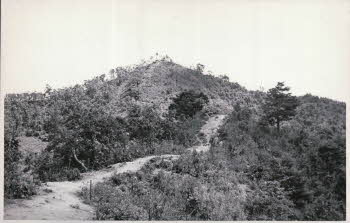
Rear slope of MLR, "C" and "D" company area, Kumhwa
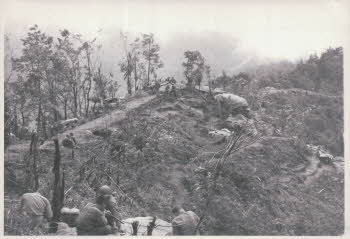
Co. "C" and "D", fighting positions on forward slope
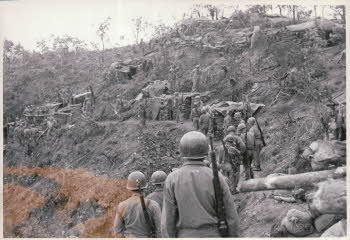
Doyle and Chamakjian were in the bunker. Four man bunker on forward slope, Co.D., 17th Infantry. Regt. Kumhwa
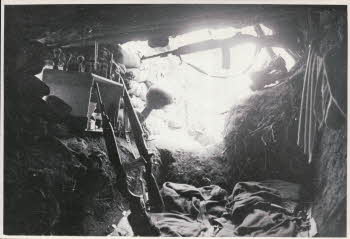
Chakmakjian and Camarillo cleaning weapons on top of bunker, MLR at Kumhwa North Korea
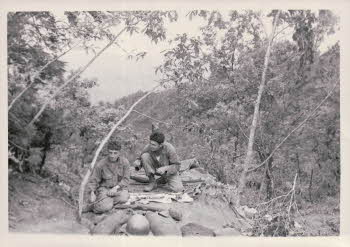
SGT. Carl Cook, SGT. Fred Staton, SGT. John R. Berns of top of 30 cal. Herby MG bunker
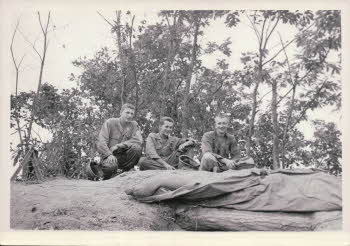
SGT. Fred Staton, SGT. John R. Berns and SGT. Carl Cook (watching poundinging "Old Baldy", as viewed from the MLR, about ten miles out)
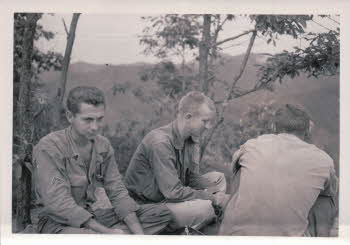
(from left to right) Crider, Camarillo (standing), Peter Doyle, Berns (in back, seated), Clodfelder (at right), MLR at Kumhwa North Korea
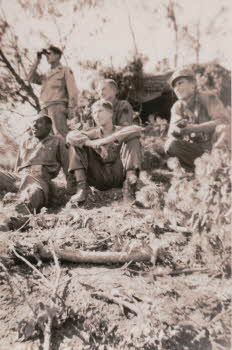
Camarillo (back in the pic). No mans land, patrols only.
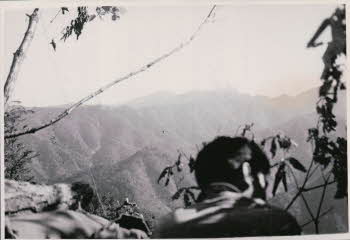
What it is like in Korea
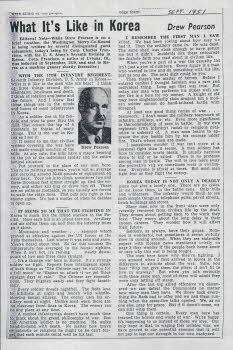
Battle stories of U.S. 7th Division, The Third Battallion of the 17th Infantry "Buffalo" Regiment
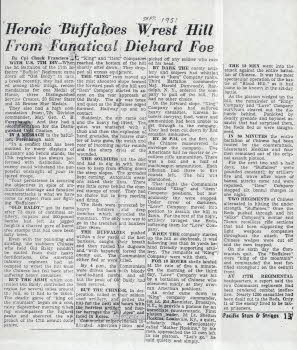
Describing where U.S. army was heading, and combat situation
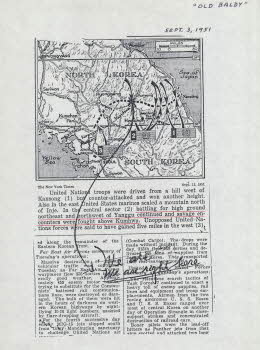
Going for "Old Baldy" (also known as hill 851), north of Kumhwa, (from left to right) Berns, Hiday, Sam Servoss, Bacon, ?, Camarillo, and Young medic. After truck ride close to hill near "Baldy" **Note: This is not the "Old baldy" of 1952 battles on the wester sector in books - that was a larger and longer battle
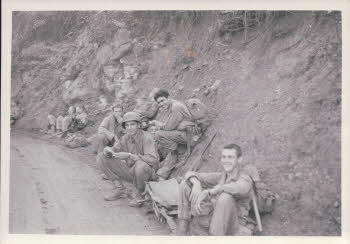
Take from hill that we gave overhead supporting fire with our 30 Cal. M.S.G., view is straight in front of us, looking north.
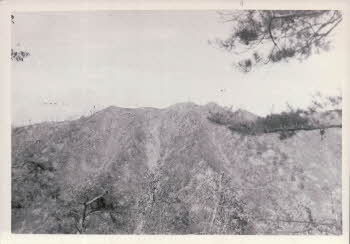
Camarillo and SGT. Maynard who had cigarette. The pic taken from supporting hill (occupied) at August 30, 1951. And gave supporting fire for 1st battalion on August 31 (the day of attack)
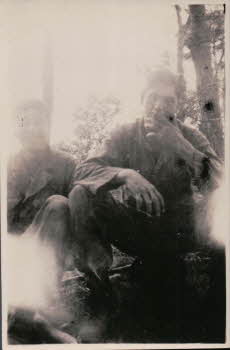
Peter Doyle, The pic taken from supporting hill (occupied) at August 30, 1951. And gave supporting fire for 1st battalion on August 31 (the day of attack)
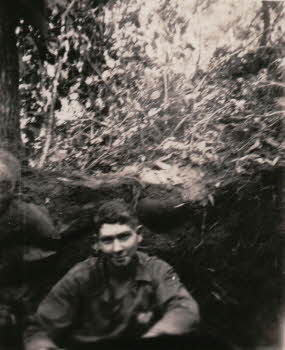
Doyle said "Supporting fire given Aug. 31 and rifle co.s of 1st Bn. Occupied part of Baldy. They secured their section Sept. 1st and then we 30s +75s joined them same day".
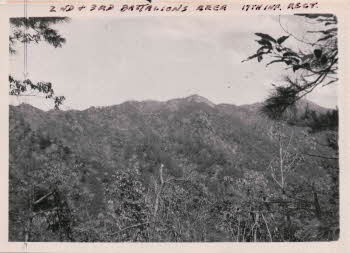
Part way "Old Baldy", Camarillo and Chakmakjian
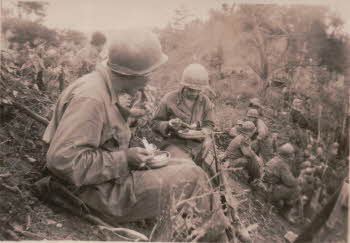
Part way "Old Baldy", Peter Doyle
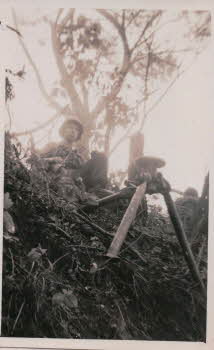
SGT. Harry Stewart, gunner from Harlan county, NY
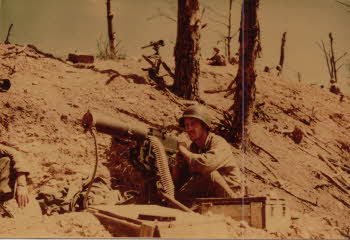
Baker Co. Rifle man
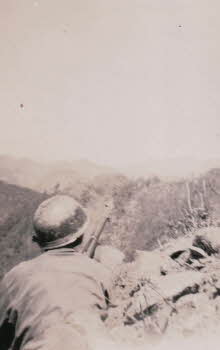
(From left to right) SGT. John Berns, squad leader Chakmakjian, and gunner Hiday
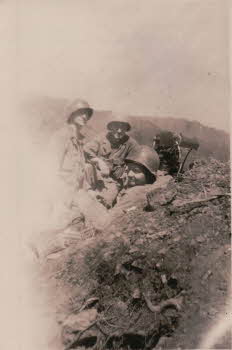
Doyle, ammo bearer, and Camarillo, ammo bearer
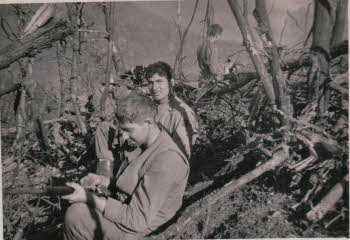
Chakmakjian, ammo bearer. He never drops out when marching and climbing
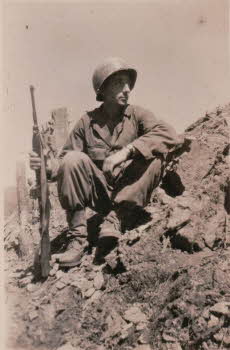
Camarillo, SGT. Maynard, and Jo Joong Koo
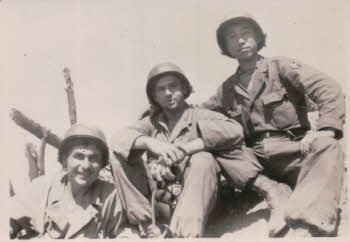
Shared with Bacon their wood roof was blown off the night before
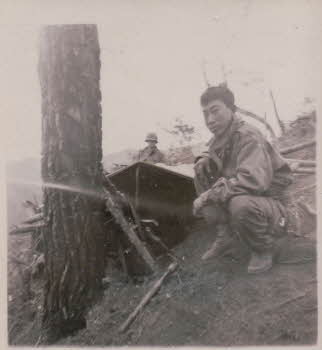
Peter Doyle's squad leader SGT. John Berns at Old Baldy. The view is to the west where 31st Regt. + Ethiopian battalion were. Shell holes can be seen from our artillery. Battles continued there after 'Old Baldy'. Enemy attacked two nights in a row over there.
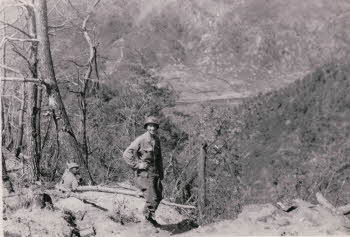
"Old Baldy taken by 17th INF. REGT. DOG Co. area"
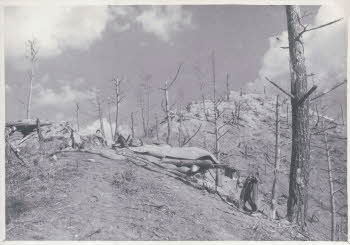
Rear Slope of "Old Baldy" Dog Co., 17th INF. REGT. (From left to right) Phelps, SGT. Fred Staton, SGT. Harry Stewart, Clodfelder
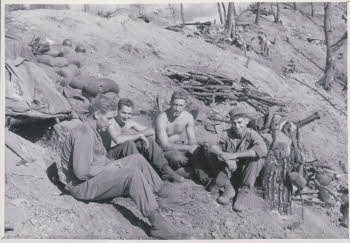
Corporal Patrick Anderson with Carbine, but was marching gunner, same squad as Peter Doyle in Dog Co., 17th REGT. 7th Division. Hometown is Weirton, West Virginia.
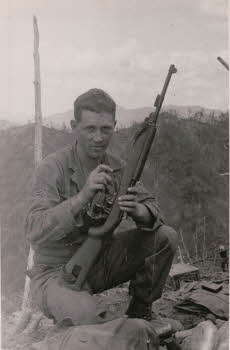
Gambling playing black jack, SGT. John Berns, center with cigarette, SGT. Harry Stewart with cigarette at right
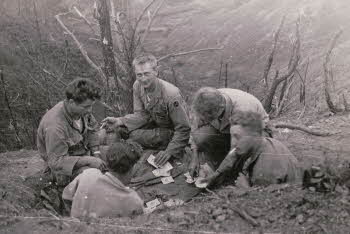
Sitting around and playing card games at Old Baldy
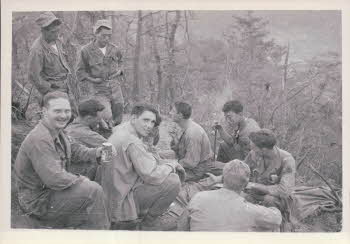
Sitting around and playing card games at Old Baldy
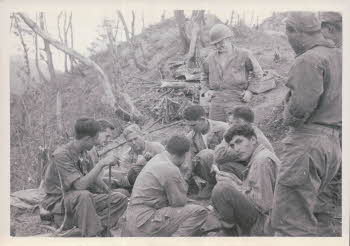
Dog Co. 81mm Mortar Positions, bottom of hill at base of Yama for a better meal.
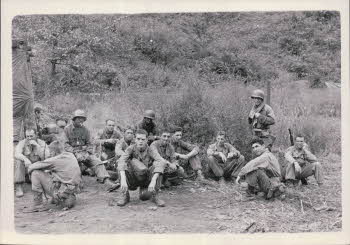
SGT. Staton, young medic, and Charkmakjian
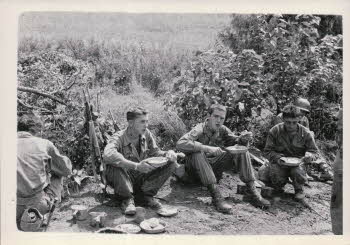
Bacon, Colgate, Chakmakjian, and Doyle
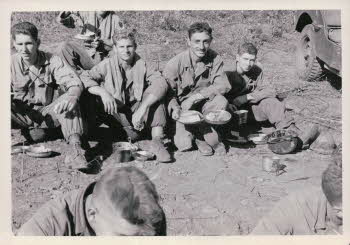
Bathing in Creek (from left to right) Staton, Chakmakjian, Berns, and Esbernet
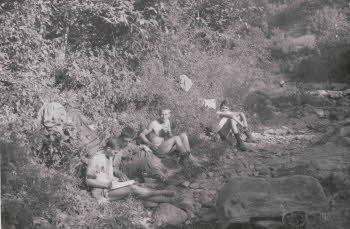
Bathing in creek, some incoming artillery
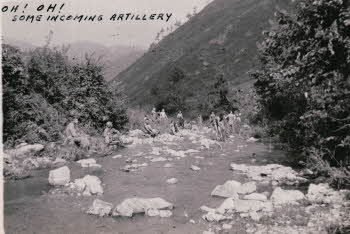
8 in. gun at the Kumhwa positions, MLR
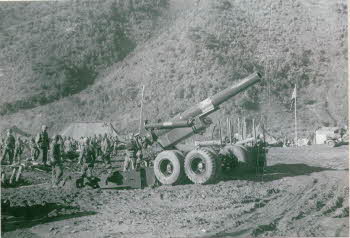
Propaganda to North Korean soldiers
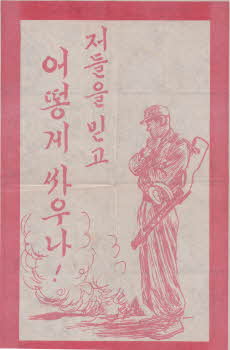
Propaganda to North Korean soldiers -cartoon
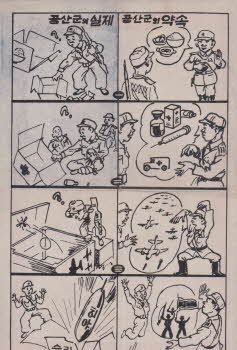
Safe conduct pass, good treatment to enemy soldiers
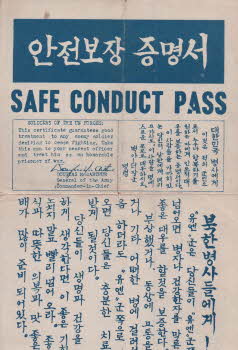
Safe conduct pass, good treatment to enemy soldiers with pictures
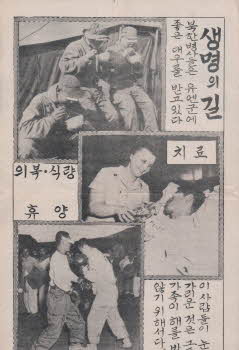
A propaganda letter from the Chinese people's volunteer forces
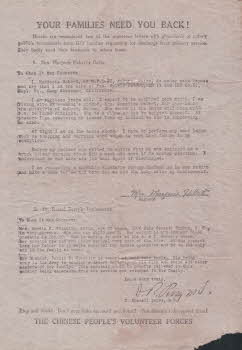
A propaganda flyer from the Chinese peoples volunteer forces
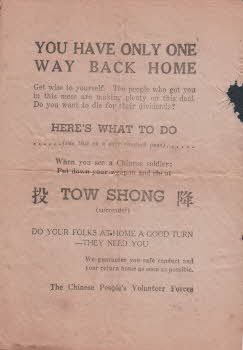
A music score of a traditional Korean folk song in English
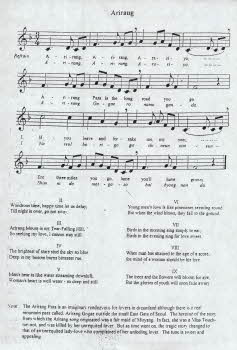
A letter from Catholic Chaplain to Peter Doyle's family
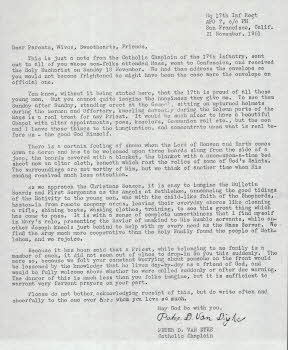
Korean soldiers in reserve area at Tokkol-li near Yang-gu
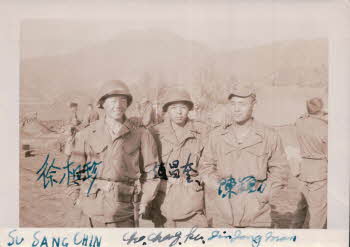
Anderson and Tofsly
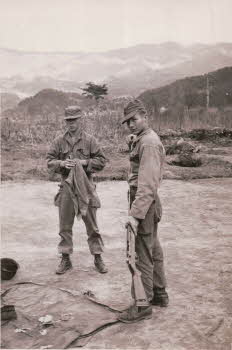
Eduardo Suarez of New Mexico
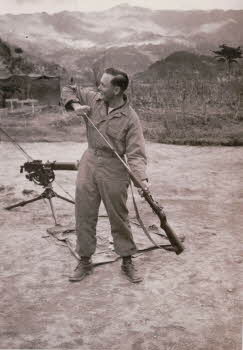
(From left to right) Peter Doyle, Jin Jong Man (June bug), Leo Chakmakjian
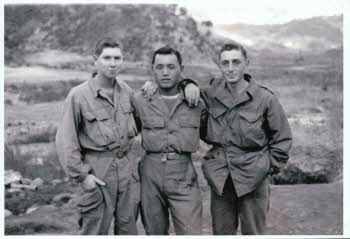
2 wheel drive, reserve area Yang-gu
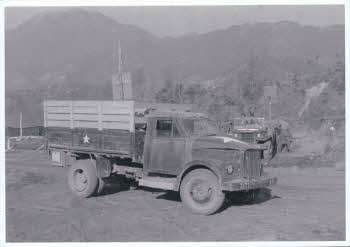
Dog Company field exercise
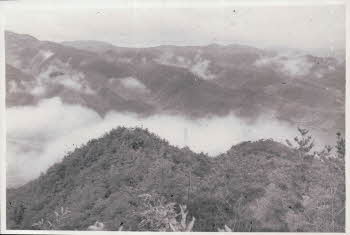
Dog Co. men just arrived at Punchbowl front from Yang-gu. At left, Jo Joong Koo, ROK soldier
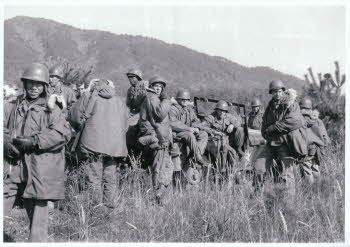
Patrick Anderson, 1st gunner, carrying firewood across ridgeline to MG bunker on forward slope
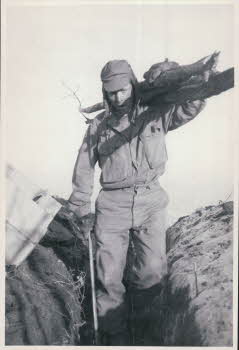
The peak of hill 1243 and rear slope, men building 1st Battalion commander's bunker. 17th INF. REGT. "Punchbowl".
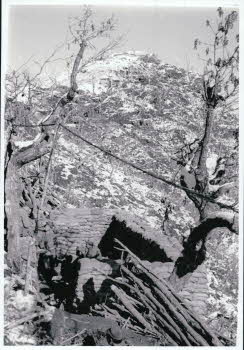
SGT. Harry Stewart and Ha Yong Sub (from Pusan), ROK soldier, Hill 1243 - Punchbowl
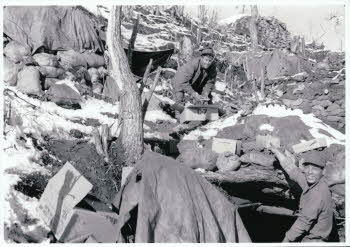
At left, SGT. Carl Cook and SGT. H Stewart at right, Hill 1243 Punchbowl
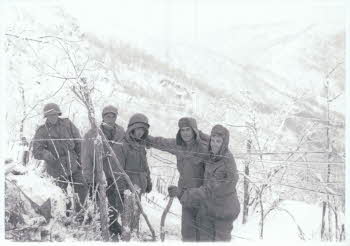
Hill 1211 (center) seen from hill 1243 Punchbowl
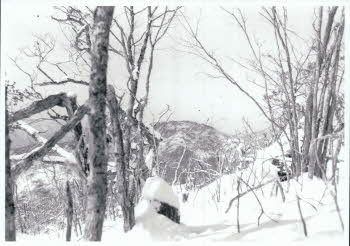
8th Army head quarter building, Inchon-Seoul area
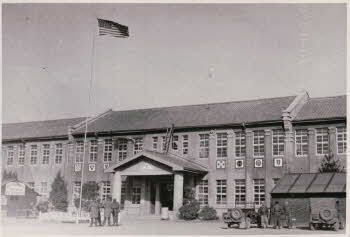
A map of Korean war posted on The Post Standard
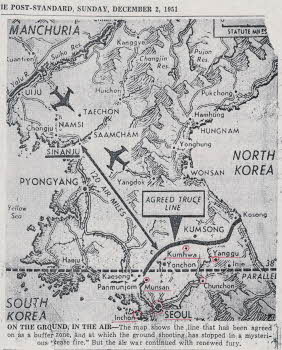
(Taken by ROK soldier, from left to right) Che Chang woo, Jin Jong Man, Su Sang Chin, all standing. In lower front, only head and shoulder shown is Jo Joong Koo. At Punchbowl, reserve area, North Korea
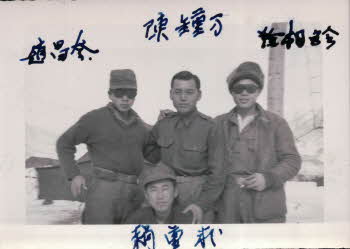
He was in the MG platoon, wearing fatigue cap and sweater. In front of volleyball net. (his name signed in Korean on front). Snow on ground. Punchbowl, reserve area, N. Korea
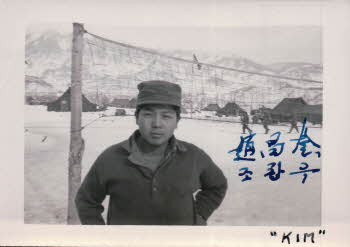
They are wearing 17th REGT. chest pins on their pile caps.
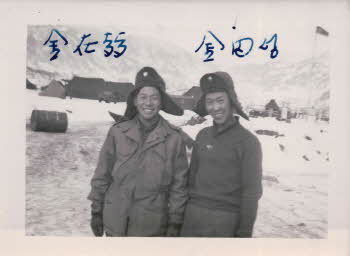
Close up, no hat. Nick name was "June Bug". Killed on White House mountain in 1953, a very fine young man who showed a lot of promise.
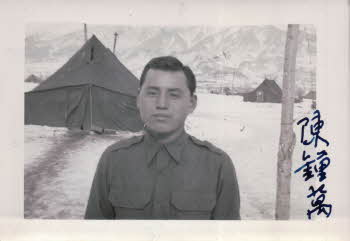
At right is ROK soldier Jo Joong Koo of MG platoon, 2nd section, Dog. Co., 17th INF. REGT., at left, Kim Guite Sune is his brother who is wearing the earlier cap 17th REGT. Chest pin on his pile cap.
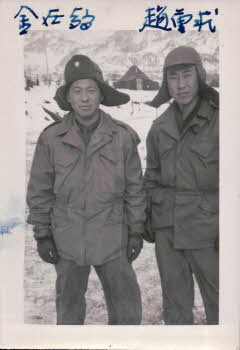
Standing by volleyball net, wearing pile cap, Chin is wearing sunglasses.
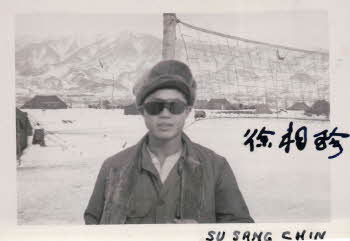
ROK soldier standing by volleyball net, holding his mess pieces in right hand. Members of MG platoon, Dog Co., 17th INF. REGT.
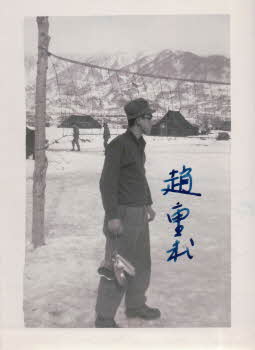
Last stop before embarking to Korea
